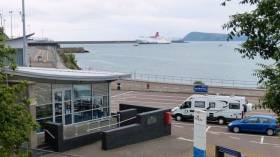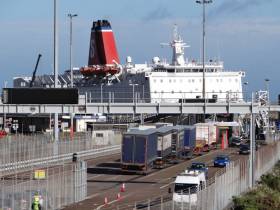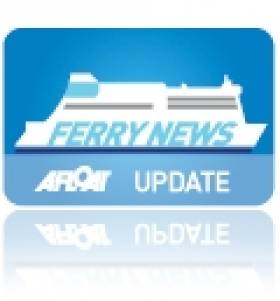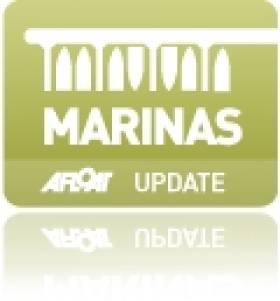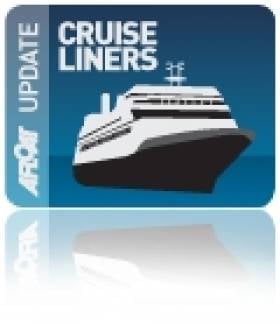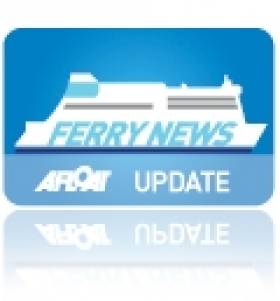Displaying items by tag: Fishguard
RNLI lifeboats from Ireland and the UK launched to a Mayday distress call from a fishing vessel taking on water on Friday (8 March).
The 24-metre Irish trawler had five crew onboard and was some 21 nautical miles northwest of Strumble Head near Fishguard in south Wales when HM Coastguard tasked the charity's Welsh lifeboats just before midday.
The all-weather lifeboats and volunteer crew from St Davids, Fishguard, Newquay made best speed to the scene.
HM Coastguard’s search and rescue helicopter R936 from Caernarfon also tasked to assist and was first to arrive on scene, lowering a water pump to the vessel.
With no casualties reported, Newquay lifeboat was stood down en route. St Davids’ Tamar class lifeboat Norah Wortley arrived at 1.10pm with sea conditions rough in a Force 5-7 easterly wind. Fishguard RNLI’s Trent class lifeboat Blue Peter VII arrived at 1.35pm.
With no engine damage and the coastguard pump sufficiently reducing the water level, it was decided the fishing vessel would be escorted the 35 nautical miles west to Ireland.
 St Davids RNLI escorting the trawler as Kilmore Quay lifeboat arrives | Credit: RNLI/St Davids
St Davids RNLI escorting the trawler as Kilmore Quay lifeboat arrives | Credit: RNLI/St Davids
Kilmore Quay RNLI’s Tamar class lifeboat Victor Freeman was tasked by the Irish Coast Guard to complete the escort and launched at 2.10pm. At this point, the Fishguard lifeboat was stood down and returned to Wales.
St Davids RNLI escorted the trawler a further 20 nautical miles west-southwest towards Tuskar Rock until the Kilmore Quay lifeboat arrived at 3.20pm and took over the escort, getting the vessel safely into port around 6pm.
Will Chant, RNLI coxswain for St Davids RNLI’s all-weather lifeboat said: “This rescue was a good, fast response from all crews, which with an incident of this nature was exactly what was required.
“Fortunately the salvage pump from the helicopter was all that was required in order to quell the problems on board the trawler, and after that it was a straightforward but long job of escorting the vessel to safety.
“Our crew even received ‘welcome to Ireland’ messages on their mobile phones, such was the distance from home.”
Operator Stena Scraps £5m Improvement Plan for Fishguard
#FerryNews - Operator, Stena Line has dropped plans for a £5m upgrade at its Port of Fishguard terminal in Pembrokeshire, south Wales.
The company, BBC News reports was planning to replace the flexible ship-to-shore bridge that allows vehicles and passengers on or off at different heights of the tide.
The work would have meant the closure of the port for three months early next year.
Stena said it did not now "have a timescale for future developments".
The ferry operator invited tenders last year for the work to replace the Linkspan bridge on its Fishguard to Rosslare route.
For more on the story, click here.
Plan By Stena to Close for Three Months Fishguard Ferry Terminal
#FerryNews - The south Wales port of Fishguard's ferry terminal could close for up to three months according to the operator, Stena Line.
The temporary closure reports BBC News, would allow for the replacement of the mechanised bridge that links the ferries to the dock in a £5m project.
It is understood that the most likely period is from February next year.
Stena Line said it was "committed to examining the possibilities of investing in key elements of the port infrastructure".
The company is looking at replacing the current Linkspan provision, the key ship-to-shore connection that allows vehicles to board and disembark at different tide heights.
For more on this development, click here.
Ferries in Collision at Rosslare Harbour
#FERRY NEWS - A Stena Line ferry was unable to dock in Rosslare last night after a collision with an Irish Ferries passenger craft in heavy winds.
TheJournal.ie reports that the Stena Europe ferry was attempting to dock at Rosslare Harbour after its arrival from Fishguard around 6pm when it made contact with the starboard bow of the Oscar Wilde, which was stationary in port.
RTÉ News says that neither vessel was badly damaged in the incident, but docking was postponed pending the departure of the Irish Ferries vessel, which was expected around 11.30pm last night.
More than 500 passengers and crew were on board the ferry at the time of the incident, which occurred amid gusts of up to 35 knots.
The return journey to Fishguard and this morning's Fishguard-Rosslare sailing were cancelled while an inspection of the vessel gets underway.
Fishguard Marina Gets Green Light as 450-Berth Plan Approved
#MARINA NEWS - Outline planning permission has been granted for a new 450-berth marina in Fishguard, according to BBC News.
An 80-acre site comprising much of the south side of the harbour, near the Stena Quay used for ferry services across the Irish Sea to Rosslare, will be home to the new development that will also include 250 apartments and a number of shops and restaurants, and is expected to make a "significant" contribution to the local economy.
A light industrial area with a boatyard and workshop are part of the plans, as well as two breakwaters to protect the development from waves in Fishguard Bay.
The marina scheme will also feature a visitors centre, after discussions with local community conservation group Sea Trust and other parties.
Local politicians and business leaders are supportive of the scheme's potential to generate jobs and tourism. But residents have expressed concern at the scale of the development, fearing it will create an "enclave" for the boating community that will not be integrated with the town proper.
BBC News has more on the story HERE.
Clipper Cruiseship Calls In for Fish & Chips
According to her schedule the Clipper Odyssey has since made several calls to include Waterford, Cobh and along the stunning scenery of the western seaboard with anchorage calls off the Great Blasket Islands, Dingle.
Yesterday the 5,218 tonnes vessel operated by Clipper Cruiuses had also called to Inishmore of the Aran Islands. Otherwise the 120 passenger cruiseship is normally found serving in the Pacific Ocean from New Zealand to the Russian Far-East. She is due to depart Co. Donegal this evening bound for Portrush.
As for the 226-passenger Le Diamant she is a frequent caller not just to Dublin, she had arrived from Penzance. The 8,282 tonnes vessel is run by Marseilles based Ponant Cruises and the twin-funnelled vessel is due to depart this evening for Fishguard.
Seasonal Scenes Set for Fishguard
Fast-ferry Stena Lynx III departed Dun Laoghaire for Fishguard Harbour on a repositioning voyage today, writes Jehan Ashmore.
The 80m craft built in Hobart, Tasmania is due to dock at the Pembrokeshire port this afternoon in advance of seasonal sailings on Stena Line's Fishguard-Rosslare.The Stena 'Express' fast-ferry service is to resume in just over a fortnight's time. Sailings are scheduled to a daily single round trip between 1 July-4 September.
The 627 passenger / 120 car capacity fast-ferry will operate in tandem with the year-round operated conventional ferry-service served by the Stena Europe. Passage times are 120 minutes for the fast-ferry service while the Stena Europe takes 3 hours 30 minutes to sail across the St. Georges Channel.
In the same week that the fast-ferry takes up summer sailings from Fishguard, the small French flagged cruiseship Le Diament is to make the first of three calls in July and once in August.
The motoryacht-like vessel which can accommodate 226 passengers is the first cruise caller of the season and is run by the only French-owned cruise operator Compagnie De Iles Du Ponant.



























